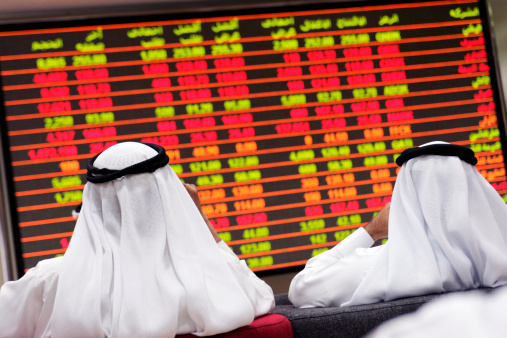Middle East Funds Bullish On Regional Equity Markets
Survey finds that 47 per cent of the funds expect to raise their equity allocations to the Middle East over the next three months.

Middle East fund managers are willing to buy most of the region’s main equity markets on dips, believing corporate earnings and balance sheets will continue improving this year, a monthly Reuters survey shows.
Markets retreated early this month as retail investors rushed to take profits during the worst of the geopolitical uncertainty over Ukraine. Dubai’s bourse fell 6.7 per cent from its peak close to its trough. Qatar’s bourse dropped 3.8 per cent.
But many fund managers said they did not view the pull-back as a sign of long-term vulnerability in the markets, but as an opportunity created by natural volatility.
“We welcomed the panic selling in Qatari and UAE equities during March,” said Akber Khan, director of asset management at Qatar’s Al Rayan Investment.
“It offered attractive entry points for a number of companies with strong market positions, solid balance sheets and impressive cash flows.”
The survey of 15 leading investment managers, conducted over the past 10 days, found 47 per cent of them expected to raise their equity allocations to the Middle East over the next three months, while only 13 per cent expected to reduce them.
That was down slightly from the results of last month’s survey, when 53 per cent – a four-month high – expected to raise their equity allocations and none expected to reduce them.
“I expect markets to do well as local economic catalysts are solid and corporate performance remains strong,” said John Sfakianakis, chief investment strategist at Saudi Arabian investment firm MASIC.
The survey showed a significant shift in fund managers’ view of fixed income, however, after U.S. Federal Reserve Chair Janet Yellen made comments last week which were interpreted to mean interest rate hikes could come in about a year’s time, sooner than anticipated.
Only seven per cent of managers expect to increase their allocations to Middle East fixed income in the next three months, while 20 per cent expect to cut them. That compares with a positive ratio of 20 per cent and a negative one of 13 per cent in last month’s survey.
The survey was conducted by Trading Middle East, a Reuters forum for market professionals.
BULLISH
Managers are most bullish towards Egypt, because of a view that the country is making progress in its transition to elections, with army chief Field Marshal Abdel Fattah al-Sisi – seen as the best guarantor of stability – set to become president.
Forty per cent of respondents in the survey expect to raise their equity allocations to Egypt over the next three months, while none expect to reduce them.
Buying intentions also outweigh selling intentions by considerable margins in the United Arab Emirates and Saudi Arabia.
“I believe that Q2/2014 will witness good pick-up in UAE markets especially, benefiting from the dividend distributed which is larger than last year, and the Q1/2014 announcements by mid-April,” said Mohammed Ali Yasin, managing director at the UAE’s NBAD Securities.
Although some funds have already moved, Yasin said more foreign money would flow into the UAE and Qatar in the run-up to their inclusion in MSCI’s emerging markets index in May.
Bullishness towards Qatar has decreased since last month, however, in part because of major stocks going ex-dividend, and perhaps in part because of the country’s diplomatic dispute with its Gulf neighbours; Saudi Arabia, the UAE and Bahrain withdrew their ambassadors, saying Qatar had failed to commit to regional security policy.
Fund managers said major amounts of money had not left Qatar because of the dispute, but Gulf Cooperation Council investors have significant holdings in Qatar, which could be in doubt if the dispute escalates.
A third of managers said they expected to raise equity allocations to Qatar, down from 47 per cent in last month’s survey. The ratio of bearish managers increased to 27 per cent from seven per cent.
Managers have been bearish on Turkey since the survey was launched last September, because of currency instability, a corruption scandal plaguing the government and the approach of elections this year. Thirteen per cent expect to raise equity allocations to Turkey, while a third intend to cut them.
